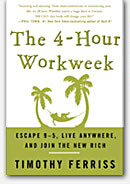It’s amazing what you find on YouTube. Here’s an interview with Jurgen Habermas.
Daily Archives: May 11, 2007
Facebook to do advertising. Well, there’s a surprise
Odd that it took them so long. Nick Carr has some sharp observations, plus a suggestion.
Yesterday, Facebook let it be known that it would launch a free classified-advertising service, which will compete with Craigslist. That’s a smart move. Facebook’s core users – college and high-school kids – are also big users of Craigslist. When Facebookers go off-network, Craigslist is probably one of their most likely destinations. So creating an in-network version of Craigslist will significantly expand Facebook’s control over its members’ online time. “We don’t try to lock people up or take more of their time,” Facebook founder Mark Zuckerberg fibs to the New York Times today. Then he tells the truth: “If we can provide people with efficient tools, they will use the site more.” Every page view Zuckerberg steals from Craigslist is money in his pocket.
But if Craigslist is a big draw for Facebook members, my guess is that Wikipedia is an even bigger draw. I’m too lazy to look for the stats, but Wikipedia must be at or near the top of the list of sites that Facebookers go to when they leave Facebook. To generalize: Facebook is the dorm; Wikipedia is the library; and Craigslist is the mall. One’s for socializing; one’s for studying; one’s for trading…
Brown’s Big Idea?
Matthew d’Ancona thinks that Gordon Brown may have some genuinely Big Ideas.
Stand by for a huge constitutional debate: that was one of many messages to be drawn from Gordon Brown’s launch this morning. Asked whether his plans included a written constitution, he would only say that he favoured a “better constitution”. But there was an explicit promise to curb the Crown prerogative, make Parliament more powerful, submit certain government appointments to parliamentary oversight, and (less overtly) entrench citizens’ rights and responsibilities in some way. Gordon left us is no doubt that he is thinking big.
Meanwhile, over on OpenDemocracy.net, Anthony Barnett sets out a list of what a new constitutional settlement would have to cover.
Er, remind me again: what happened to the Sioux?
I rubbed my eyes when I read this Reuters report
At a panel discussion on the second day of the 56th annual National Cable & Telecommunications Association conference, top executives said talk of the demise of traditional media in the digital age was overblown.
While new distribution technologies like the Internet and mobile phones are siphoning television audiences, media companies argued that the Web also brings new revenue streams.
But the discussion quickly moved to criticism of the perception that traditional media businesses are dead, and to the rampant copyright offenses enabled by new digital technologies.
“The Googles of the world, they are the Custer of the modern world. We are the Sioux nation,” Time Warner Inc. Chief Executive Richard Parsons said, referring to the Civil War American general George Custer who was defeated by Native Americans in a battle dubbed “Custer’s Last Stand”.
“They will lose this war if they go to war,” Parsons added, “The notion that the new kids on the block have taken over is a false notion.”
Brown in Cyberspace

Hmmm… Gordon Brown has a web site. But it’s called GordonBrownForBritain.com. GordonBrown.com is a Blogger-hosted blog run by someone who doesn’t seem particularly enamoured of the Chancellor. Someone on Brown’s team missed a trick there, methinks. The domains GordonBrown.net, .org and .info are taken, but GordonBrown.us and GordonBrown.biz are still available.
Google’s strategy: order out of chaos
From today’s New York Times…
Speaking at the annual shareholder meeting on Thursday, Eric E. Schmidt, the chief executive, said Google’s long array of initiatives was organized around three ideas.
“Our next strategy evolution is to really think about three components,” Mr. Schmidt said. “Search, ads and apps,” he said, using a common shorthand for applications, or software programs.
The move is less a strategy shift than a new message — a way for Google to talk about its disparate initiatives in a way shareholders and the public can readily understand.
“It is worth saying that our underlying mission has not changed,” Mr. Schmidt noted.
The first two — search and ads — are well known to shareholders, and they account for virtually all of the company’s success. The third — apps — puts under one umbrella Google’s growing business of offering an eclectic mix of software.
Mr. Schmidt said the unifying theme behind the seemingly disparate programs was that they resided on the Web, rather than on users’ PCs, and were available wherever there is an Internet connection.
The programs include photo storage, social networking, online calendars, e-mail, instant messaging, word processing and spreadsheets. Most are free, and many compete with paid offerings from Microsoft. But Google has started charging businesses for some of them. “That is a business that looks like it is going to grow very nicely for us,” Mr. Schmidt said.
But a shareholder proposal to force Google to resist censorship in countries with authoritarian regimes like China was defeated “by an undisclosed tally”.
Surprise, surprise. Corporations don’t do ethics, any more than my cats respect fledglings’ rights.
The 4-hour working week

Hmmm… I like the sound of this. But I’m afraid it will be like one of those diet books which show how you can eat all the steak frites you want and still fit into size 10 jeans.
Bet Prez Sarkozy takes a dim view of this kind of thing. After all, he disapproves of the 35-hour working week.
